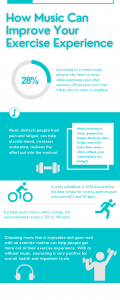By: Savannah Cloud
Working out is not always fun and sometimes people struggle with the motivation to even do it. There are so many reasons why people decide to make a change in their lives and start working out. Some are wanting to become healthier and more active, some are trying to lose weight and gain muscle and others want to because it is fun and something they enjoy doing. In each of these options there tend to be bad days where there is no motivation and working out seems to be more of a chore. Some people just cannot get in the right head space and may skip that day or perform poorly. Something that may help with this is music. It has been said so many times before, listening to music can improve your mood while exercising. Turning on a good playlist to listen to while working out can make people run faster with the beat or push harder when getting into an upbeat song. Studies have shown that listening to music actual does improve the quality of a workout!
“Can Running with Music Aid Performance? Pros & Cons (2020).”
origympersonaltrainercourses.co.uk/blog/running-with-music.
Listening to music while exercising has proved to increase stamina and put people in better moods(North and Hargreaves 2020). Music can lead to synchronized steps within the beat and movements while working out. Fast paced music tends to make people want to keep up with it and can lead to increasing pace or longer distances. There is actually a psychological effect connecting working out and listening to music and having a better mood. Hormone levels change within the body that gives someone a mood boost by releasing serotonin in the body. North and Hargreaves 2020, suggest that music distracts from pain that happens in exercises through competing emotions, because it is easier to forget about pain or fatigue when a song you enjoy is distracting you (North and Markell, J 2020). When working out and listening to something that makes you happy, it can change the entire mood for the workout.
The benefits of listening to music when working out can include pushing the feeling of pain and fatigue out of the mind and just focusing on the workout. Another benefit is increasing endurance due to the tempo of the music. A fast-paced song can have an effect on how fast someone completes a workout that includes steps or cycling. Another important benefit is increased mood. Some people cannot workout unless they have their music playing in their headphones or out loud and others need it to be quieter to focus. Either way is fine because working out is the main priority and whatever it takes to complete it is positive for health. Everyone wants a good experience with exercising and choosing things that are enjoyable and motivating can help with that!

